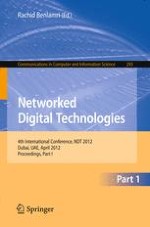2012 | OriginalPaper | Buchkapitel
Robust Wireless Sensor Networks with Compressed Sensing Theory
verfasst von : Mohammadreza Balouchestani, Kaamran Raahemifar, Sridhar Krishnan
Erschienen in: Networked Digital Technologies
Verlag: Springer Berlin Heidelberg
Aktivieren Sie unsere intelligente Suche, um passende Fachinhalte oder Patente zu finden.
Wählen Sie Textabschnitte aus um mit Künstlicher Intelligenz passenden Patente zu finden. powered by
Markieren Sie Textabschnitte, um KI-gestützt weitere passende Inhalte zu finden. powered by
Wireless Sensor Networks (WSNs) consist of a large number of Wireless Nodes (WNs) each with sensing, processing, communication and power supply units to monitor the real-world environment information. The WSNs are responsible to sense, collect, process and transmit information such as pressure, temperature, position, flow, vibration, force, humidity, pollutants and biomedical signals like heart-rate and blood pressure. The ideal WSNs are networked to consume very limited power and are capable of fast data acquisition. The problems associated with WSNs are limited processing capability, low storage capacity, limited energy and global traffic. Also, WSNs have a finite life dependent upon initial power supply capacity and duty cycle. The WSNs are usually driven by a battery. Therefore, the primary limiting factor for the lifetime of a WN is the power supply. That is why; each WN must be designed to manage its local power supply of energy in order to maximize total network lifetime [5]. The life expectancy of a WSN for a given battery capacity can be enhanced by minimizing power consumption during the operation of the network. The CS theory solves the aforementioned problem by reducing the sampling rate throughout the network. A combination of CS theory to WSNs is the optimal solution for achieving the networks with low-sampling rate and low-power consumption. Our simulation results show that sampling rate can reduce to 30% and power consumption to 40% without sacrificing performances by employing the CS theory to WSNs. This paper presents a novel sampling approach using compressive sensing methods to WSNs. First, an overview of compressed sensing is presented. Second, CS in WSNs is investigated. Third, the simulation results on the sampling rate in WSNs are shown.
